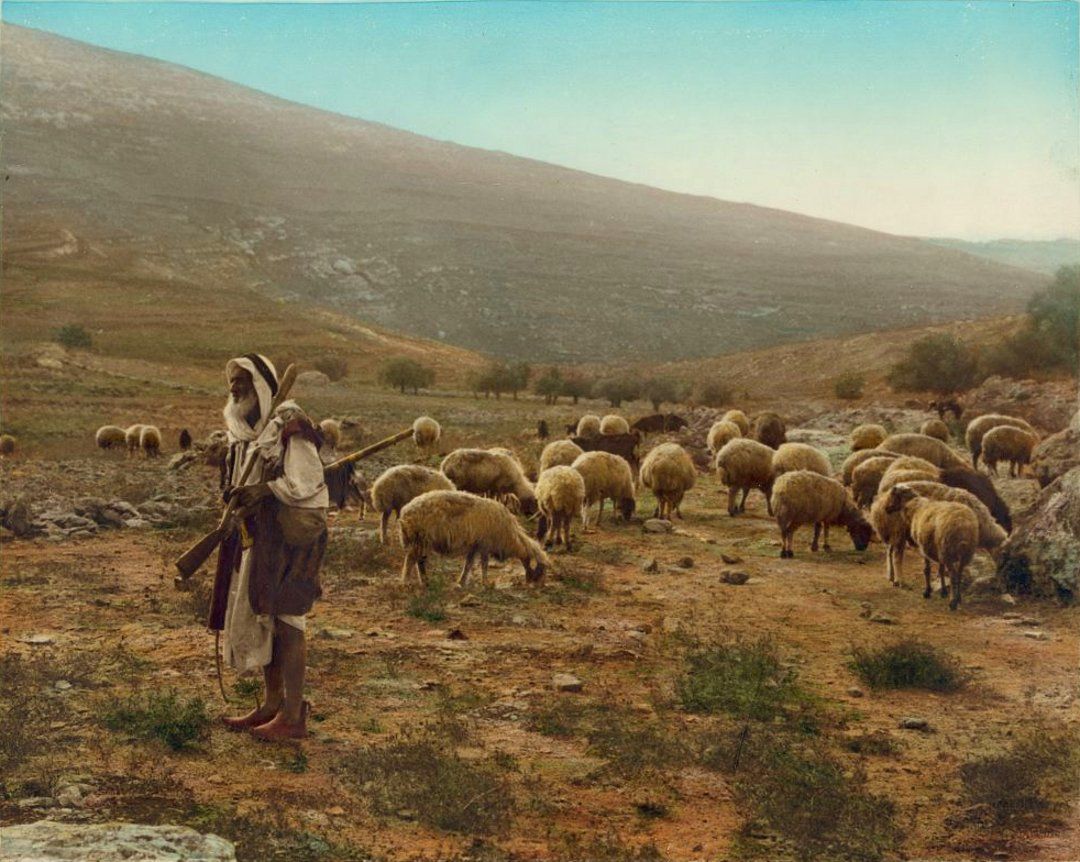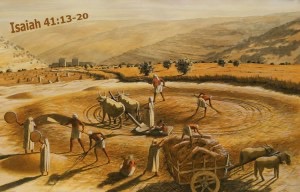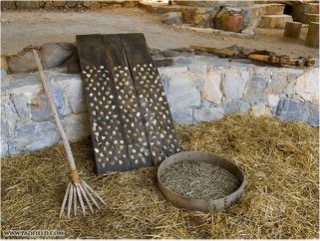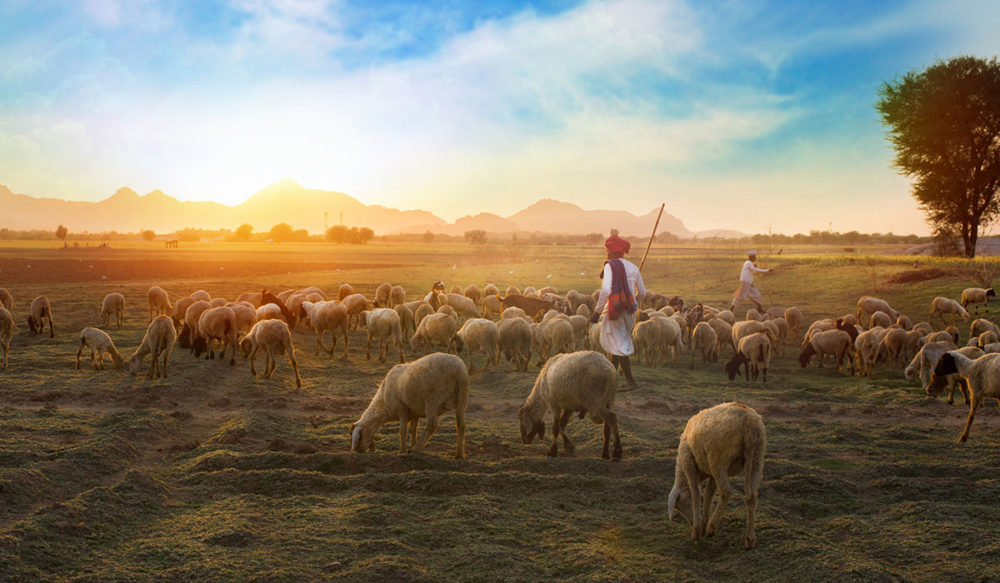The Old Testament Cultural Gap
- Nathan Schneider

I have experienced a number of embarrassing moments in my life. But one particular episode stands out because of its relevance to today’s topic of culture. I’ve written in a previous post a while back about some time I spent on mission in Ethiopia. During my time there, I had the privilege of meeting a man who was notably high up in Ethiopia’s list of dignitaries. It’s a testament to my bad memory and not to his status as a dignitary that I can’t remember any more about him. All I really remember was what happened when I met him.
I travelled to his home, a very upscale dwelling by Ethiopian standards, and each team member had an opportunity to greet him. I had been slowly getting used to the customary greeting of Ethiopia which is involves a mild and very platonic peck on each cheek. Of course, as a foreigner who stands out like a sore thumb thanks to the color of my skin, I was trying as hard as I could to fit in to the culture and adopt any practices I could. My assumption was that this dignitary would greet me in the way I was learning about. It turns out he had no such intentions.
Dignitaries, after all, have to be familiar with foreign customs, and as it turned out, he was well-familiar with the American custom of shaking hands. I did not realize this. Thus, my first encounter with this man was a handshake followed by a very awkward moment as I leaned in to plant one on this dignitary’s cheek. He laughed. I laughed. The room laughed. Then I cried inside. The end.
What really happened? I fell directly into a culture gap. And ironically, so did he. We both awkwardly tried to adjust to a foreign custom and ended up bumping heads in the process.
It is patently obvious that life today is fundamentally different than life in the ancient world, even as life in the Alaska is different than life in the Middle East. But, how different is it? Do we really appreciate and ponder the great extent to which cultural life plays into the events and accounts portrayed in the Old Testament?
As King and Stager observe,
Agrarian life, kinship relations, domestic objects, the routines of the day and the year, and other such details of the mundane world play a far greater role in the pages of the Hebrew Bible than we might initially realize. They figure into stories, laws, historical accounts, songs, prophetic critiques, and wisdom sayings—sometimes as prominent features, but just as often as background minutia. Typically readers will scarcely notice them, perhaps because they are alien to our own contexts or because they seem to fit our stereotyped notions of the character of life in antiquity (King and Stager, Life in Biblical Israel, 9).
***Consider for a moment what life might be like in another 1,000 years. As people of that day look back and study history and the culture we live in, what cultural practices do we engage in that might seem strange, foreign, or archaic to later generations?***
What follows are just a few examples of cultural elements that help elucidate the biblical text and uncover meaning and context.
Threshing and Winnowing
The agrarian life of the typical ancient Israelite would have undoubtedly included this most fundamental of agricultural practices. In Ruth 3:2, for instance, Naomi tells her daughter-in-law, “Now is not Boaz our kinsman, with whose maids you were? Behold, he winnows barley at the threshing floor tonight.”
The threshing floor was an open, level surface that was often located on an elevated area to catch breezes. At harvest time, the stalks of grains such as wheat and barley were stacked into sheaves and taken to the threshing floor. There, they were arrayed out on the floor, where threshing sledges were dragged across them. These sledges were usually wooden boards imbedded with flint or basalt studs and drawn by oxen or donkeys (Deut 25:4; 2 Sam 6:6). As the sledge dragged across the sheaves, the weight of the sledge, aided at times by the weight of the farmer standing atop it, would separate the grain from the stalk. From this point, the farmer separates the grain from the straw and chaff by means of winnowing. As the threshed grain is tossed into the air, the breeze carries the stalk and chaff away allowing the heavier grain to fall to the ground where it would be gathered and stored.
The practice of threshing and winnowing punctuates the pages of the Old Testament. Its reference and practice are found in virtually every genre of Old Testament literature:
| Ruth 3:3–6 | Ruth meets Boaz at his threshing floor |
| 2 Sam 24:16–25 | David buys a threshing floor on Mount Moriah to build an altar |
| 2 Chronicles 3:1 | Solomon builds the temple on the site of the threshing floor originally purchased by David |
| Deuteronomy 25:4 | Law concerning the practice of threshing |
| Numbers 15:20 | Law concerning the offering of the threshing floor |
| Leviticus 26:5 | Promise of long threshing seasons indicative of divine blessing |
| Proverbs 20:26 | Wisdom is connected with the punishment of wicked people, depicted figuratively as winnowing and threshing them |
| Psalm 1:4 | The wicked are compared to chaff driven by the wind—they have nothing anchoring them. While a tree (righteous person) is secured by deep roots fed by channels of water, the chaff are blown away by the slightest breeze because they do not love God’s law. |
| Isaiah 21:10 | Israel is described as a people who have been threshed on a threshing floor, figurative for an enemy attack. |
| Isaiah 27:12 | Yahweh’s judgment is likened to a great threshing beginning with Babylon and moving down to Egypt, straight over the top of Israel. This pictures Palestine as the threshing floor, and Israel as the grain to be threshed. |
| Daniel 2:35 | The kingdoms of the world are described as becoming like chaff from the summer threshing floors and carried aay by the wind before the coming of Yahweh’s kingdom. |
| Amos 1:3 | Damascus is under divine judgment for “threshing” Gilead with “implements of sharp iron,” figurative for a ruthless slaughter. It is akin to saying, “They pulverized Gilead!” |
Shepherding
Shepherding is one of the first professions mentioned in the Bible (Gen 4:2). Sheep were primarily raised for their wool (a highly prized commodity; cf. 2 Kings 3:4) as well as for their meat. They also held an important position in the cultic systems of the ancient world. Of course, examples and references to the practice of shepherding can be found throughout the pages of the Old Testament. But what is notable is how this common cultural practice became a vivid metaphor for so much spiritual teaching. Just consider Psalm 23, which uses an extended metaphor of shepherding to portray the everyday experience of the believer’s life.
| Verse | Text | Comments |
| 1 | A psalm by David | David was a shepherd before he became king. He understood what sheep needed: rest, life, guidance, and safety/security. Thus, he drew from his extensive shepherding experience to portray Yahweh as the Shepherd of His fold. |
| Yahweh is my shepherd, I do not lack | Sheep are completely dependent upon their shepherd. They are vulnerable in practically every way. Thus, the opening verse depicts Yahweh as a shepherd whose sheep never lack what they need. | |
| 2 | He makes me lie down in grassy pastures | Sheep need rest. Here the shepherd Yahweh is seen providing needed guidance to His sheep by making His flock lie down to rest. |
| He leads me beside still waters | Sheep also need guidance. They will scatter easily and must be shown where to eat and where to drink. Yahweh leads His people in much the same way. | |
| 3 |
He restores my soul. He guides me in paths of righteousness for the sake of His name |
Sheep need life and vitality. here, “the retrieving or reviving the sheep pictures the deeper renewal of the man of God, spiritually perverse or ailing as he may be.” —Derek Kidner |
| 4 |
Even though I walk through the darkest valley, I do not fear danger, for you are with me |
Sheep are especially vulnerable to attack by predators, the meandering wadis of Palestine were especially precarious. The shepherd needed to be on full alert to guard his flock. Here, the Lord is seen as a protector of His sheep through the most dangerous moments. |
|
Your rod and Your staff, they comfort me |
There is special emphasis in the Hebrew on Yahweh’s rod and staff. The shepherd’s rod was a defensive weapon to use against wild animals, similar to a mace. The staff was the shepherd’s crook intended to control the sheep. Both are utilized in this case. The rod protects while the staff guides. |
In contrast to the picture of Psalm 23, the shepherd/sheep metaphor appears in Ezekiel 34 to describe the failure of Israel’s leaders to properly guide their people:
|
Verse |
Text |
Comments |
|
2 |
“Son of man, prophesy against the shepherds of Israel. Prophesy and say to those shepherds, ‘Thus says the sovereign Yahweh, “Woe, shepherds of Israel who have been feeding themselves! Should not the shepherds feed the flock? |
The shepherd’s responsibility was to provide for his flock, even to the sacrifice of his own comfort. The leaders of Israel cared nothing for the people. They were only interested in themselves. |
|
3 |
“You eat the fat and clothe yourselves with the wool, you slaughter the fat sheep without feeding the flock. |
Israel’s leaders were profiting off the poor of the land. “The responsible shepherd did not kill and eat his sheep, no matter how rigorous the conditions might become.” –P. L. Garber |
|
4 |
“Those who are sickly you have not strengthened, the diseased you have not healed, the broken you have not bound up, the scattered you have not brought back, nor have you sought for the lost; But with force and with severity you have dominated them. |
Shepherds were responsible for mending injuries caused by accidents, predators, or by the sheep’s foolish decisions. Israel’s leaders, however, neglected the dire spiritual needs of the nation, leading them with severity rather than gentleness. |
|
5 |
“They were scattered for lack of a shepherd, and they became food for every beast of the field and were scattered. |
Shepherds were responsible for keeping their sheep safe from harm. Without their guidance, sheep tend to wander off, often into hazardous territory. Israel’s exile into Babylon is depicted in this way, and the blame is placed on the leaders for their negligence. |
|
6 |
“My flock wandered through all the mountains and on every high hill; My flock was scattered over all the surface of the earth, and there was no one to search or seek for them.”’” |
Shepherds were responsible for going after wandering or scattered sheep and gathering them back together. If the shepherd himself was not watching, then often he would hire shepherds to look after his sheep for him. Here, Israel’s leaders are depicted as hired shepherds who have defaulted on their obligation to seek out the lost sheep. They were scattered because of negligence, and they remain scattered because of indifference. |
After a harsh denunciation of Israel’s failed shepherds, Yahweh—the true shepherd of the sheep—makes this promise to shepherd Israel Himself:
|
Verse |
Text |
Comments |
|
11 |
For thus says the sovereign Yahweh, “Behold, I Myself will search for My sheep and seek them out. |
The true shepherd sought out his scattered sheep. Thus Yahweh, the true shepherd of Israel, would intervene and bring back His people from exile. |
|
12 |
“As a shepherd cares for his herd in the day when he is among his scattered sheep, so I will care for My sheep and will deliver them from all the places to which they were scattered on a cloudy and gloomy day. |
Storms were often responsible for frightening sheep and scattering them across the countryside. Israel’s exile is depicted in this way, and Yahweh will gather them from their exile. |
|
13 |
I will bring them out from the peoples and gather them from the countries and bring them to their own land; and I will feed them on the mountains of Israel, by the streams, and in all the inhabited places of the land. |
Israel is a flock in wild territory. Yahweh will gather them and bring them back to their own land, pictured metaphorically as a pasture with mountains rich for grazing. |
|
14 |
I will feed them in a good pasture, and their grazing ground will be on the mountain heights of Israel. There they will lie down on good grazing ground and feed in rich pasture on the mountains of Israel. |
The similarities between this and Psalm 23:2 are notable. Israel will feed on good ground and lie down in good pastures. This is the same kind of tender shepherding for which David exalts Yahweh. |
|
15 |
I will feed my flock and I will lead them to rest,” declares the sovereign Yahweh. |
Cf. the comments on v. 14. |
|
16 |
“I will seek the lost, bring back the scattered, bind up the broken and strengthen the sick; but the fat and the strong I will destroy. I will feed them with judgment. |
Once again, Yahweh will perform what a good shepherd must do: gather his sheep, tend their wounds, strengthen them with food, and discern those which go for slaughter and those which are to remain. |
|
17 |
As for you, My flock, thus says the sovereign Yahweh, ‘Behold, I will judge between one sheep and another, between the rams and the male goats. |
As different flocks mix together during watering, the shepherds must separate the flocks and make sure all of his sheep are accounted for. |
|
18 |
Is it too slight a thing for you that you should feed in the good pasture, that you must tread down with your feet the rest of the pastures? Or that you should drink of the clear waters, that you must foul the rest with your feet? |
Weak and sickly sheep were vulnerable even in the flock, because the healthy sheep would consume the grass and foul the waters before the weaker sheep could eat and drink. This becomes a picture of the selfishness and social injustice of the rich in Israel who gained their wealth at the expense of the poor and vulnerable in society. |
|
19 |
As for My flock, they must eat what you tread down with your feet and drink what you foul with your feet!’” |
Cf. the comments on v. 18. |
|
20 |
Therefore, thus says the sovereign Yahweh to them, “Behold, I, even I, will judge between the fat sheep and the lean sheep. |
“Like a shepherd who must judge between sheep to be bred or sold or butchered, the Lord will judge between people who need his care and those who deserve his judgment.” –Lamar Cooper |
|
21 |
“Because you push with side and with shoulder, and thrust at all the weak with your horns until you have scattered them abroad, |
The selfishness of the people, pictured as rams that push and butt weaker sheep aside, is said to be the reason for Israel’s exile. |
|
22 |
“Therefore, I will deliver My flock, and they will no longer be a prey; and I will judge between one sheep and another. |
Cf. the comments on v. 21 |
|
23 |
“Then I will set over them one shepherd, My servant David, and he will feed them; he will feed them himself and be their shepherd. |
David, the ultimate picture of the shepherd king. Psalm 78:70-72 states that God “chose David His servant and took him from the sheepfolds; from the care of the ewes with suckling lambs He brought him to shepherd Jacob His people, and Israel His inheritance. So he shepherded them according to the integrity of his heart, and guided them with his skillful hands.” In the same way, Yahweh will provide a Davidic king—the Messiah—to be Shepherd over Israel. This is a prophetic announcement of Christ’s future reign over Israel in the Millennial Kingdom. |
All of this imagery greatly illuminates our understanding of New Testament passages that focus on Jesus, the Good Shepherd (John 10), who “was sent only to the lost sheep of the house of Israel” (Matt 15:24). This is in direct fulfillment of the Messiah’s role as a Davidic shepherd who comes to seek out, rescue, and restore Israel, separating on the day of judgment the sheep from the goats (Matt 25:32-33).
Summary
King and Stager say it best when they write, “The gap between us and ancient peoples continues to widen as we become further removed from our agrarian roots. Today less than two percent of the population in the United States are farmers. In ancient Israel, it was just the opposite. Nearly everyone, even those living in royal cities such as Jerusalem and Samaria, was involved in some form of agriculture and had encounters with animals wherever they went” (King and Stager, Life in Biblical Israel, 8).
Our world has changed drastically from the world of the ancient Near East. But like it or not, that world and that culture is imbedded in the words, the stories, the images, and the paradigms of the biblical writers. Part of being a good student of the Bible is attempting to bridge that cultural gap as best we can in order to understand the meaning of the text and thus experience it’s desired effects on our lives.
Suggested Resources
There’s a lot of great resources out there to help you grasp the cultural and background issues of the Old Testament. If you’re looking to build a personal library, consider adding these to the shelf:
- King, Philip J., and Lawrence E. Stager. Life in Biblical Israel. Louisville, KY: Westminster John Knox Press, 2001. Perhaps the best single volume work on the topic of OT cultural out there. A great read with wonderful, full-color pages.
- Bromiley, Geoffrey W., ed. The International Standard Bible Encyclopedia. 4 volumes. Grand Rapids: Eerdmans, 1995. A standard reference work for all kinds of things, from geography to theology to background and cultural issues.
- Tenney, Merrill C., ed. The Zondervan Pictorial Encyclopedia of the Bible. Rev. ed. 5 vols. Grand Rapids: Zondervan, 2010. Another standard reference work worthy of any Bible study shelf.













